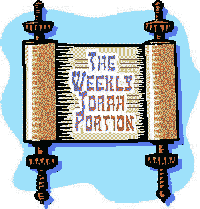Search our Archives:
» Home
» History
» Holidays
» Humor
» Places
» Thought
» Opinion & Society
» Writings
» Customs
» Misc.
|
Dispelling Darkness
By Michael Chessen
This week's reading of V'yeshev is the first of two Chanukah Shabbats
this year. Whereas next week's reading of Mikketz only falls on Chanukah
in special "double" years such as this, V'yeshev always falls on the
"Festival of Lights", and very aptly so because this Torah portion has
much in common with the holiday.
V'yeshev commences the final phase of the book of Genesis, that which
sets the stage for Jacob's family becoming the Jewish people awaiting
redemption as "strangers in a land that is not theirs", as foretold to
Abraham in the "Covenant of the Halves" (Genesis 15:13). Between these
events, however, there are a number of other events which give hint to
other future developments in Jewish history.
When Isaac is bound on Mt. Moriah as a sacrifice, the entire future
existence of the Jewish people appears to be in peril, until God reveals
the horn tangled ram as the "proper" sacrifice. In a much later period of
our history, in other physically threatening circumstances, the salvation
of the Jewish people would lead to the establishment of the holiday of
Purim.
While Isaac seems not to have feared on Mt. Moriah, years later,
after he had blessed his son Jacob in the guise of Esau and the actual
Esau then subsequently appears, Isaac is then "seized with a violent fit
of trembling"(Gen. 27:33). As Rabbi Isaac Bernstein points out, Isaac
realizes that he had been fooled by Esau's "verbal entrapments" and the
thought that future generations might similarly be spiritually led astray
by either words or deeds aroused fear within him in a manner that the
threat of physical destruction could not. Many years later the holiday of
Chanukah would commemorate the spiritual salvation of the Jewish people
from the Greeks, who had sought not to physically harm us, but to simply
"neutralize" Judaism.
In this week's Torah reading, Joseph's brothers perceive him, or
more
precisely, his dreams, as a threat to their physical existence.
Accordingly, they begin to plot to neutralize him by slaying him. Upon
reflection of the gravity that this sin would potentially carry, the
brothers decide that they can achieve the same ends by settling for the
"compromise" of throwing Joseph into "an empty pit with no water"(Gen.
37:24). Rashi's commentary here explains that the significance of the
Torah's need to inform us that an empty pit was without water is that in
the water's absence, snakes and scorpions had seeped in to fill the
ensuing vacuum. The mistaken assumption of the brothers was that a void
could remain neutral, when in reality, the absence of good actually
invites the penetration of bad.
In our day, many Jewish parents mistakenly assume that they can raise
their children to be moral by simply "refraining from bad deeds", without
the positive instruction of the Torah, which our sages compare to water,
only to find their children eventually seeking to fill their ensuing
spiritual voids from foreign sources. However, Chanukah, while occupying
only "minor" status as a holiday, has nevertheless spawned remarkably
widespread observance of the commandment to light candles for eight days.
It is well known that a minimal amount of light is capable of dispelling a
great deal of darkness. At this time of year, we should all be encouraged
by this phenomenon occurring among our people.
Wishing you all a Shabbat Shalom !

|
|
Please let us know if you see something unsavory on the Google Ads and we will have them removed. Email us with the offensive URL (www.something.com)
|





|
